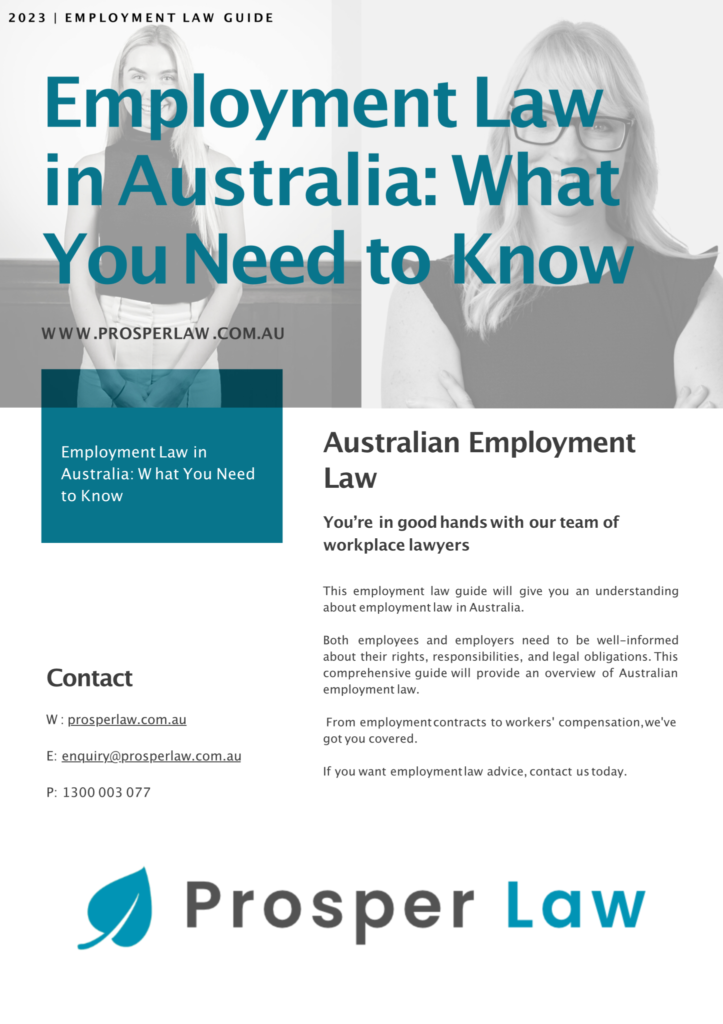When an employee engages in misconduct there are actions that an employer can take. Not all employee actions are serious; some may be classified as minor misconduct.
If you are going to terminate an employee for minor misconduct, you must know the grounds to dismiss that employee. And any action must follow the correct disciplinary procedure.
In this article, Prosper Law solicitor and workplace lawyer, Micaela Diaz, explains your rights in relation to employee misconduct that may lead to termination and the appropriate steps to take.
Termination for Major Misconduct
Meaning of Major Misconduct
Major misconduct is the behaviour of an employee in the workplace that is contrary to the continuation of the employment. It is a threat to a person or business, often involving illegal or dangerous activity.
Examples of Major Misconduct
Here are some of the most common examples of major misconduct in the workplace:
- Damage to company property and vandalism
- Fraud
- Theft
- Breaches of Safety
- Intoxication at work
- Threats or Acts of Violence
Disciplinary Action and Entitlements
An employee terminated for major misconduct is not entitled to notice or pay in lieu of notice under the Fair Work Act 2009 (Cth).
However, the employee will still get their unpaid wages, any outstanding leave entitlements, and any other entitlement he has accrued up to the date of dismissal.
Procedure for Dismissal
You must follow proper procedures when terminating an employee for major misconduct. This includes conducting a thorough investigation and allowing the employee to respond to the allegations before deciding to terminate.
If you fail to follow these procedures, the employee may have grounds to challenge the termination and seek remedies through the Fair Work Commission or other legal means.
What is Minor Misconduct?
Minor misconduct occurs when an employee engages in acts in the workplace that are unacceptable but not criminal.
The actions of the employee are inconsistent with the employee’s duties, a breach of company policy or generally unacceptable.

Such misconduct is less damaging to the reputation of the personnel and assets of the employer.
Examples Of Minor Misconduct
Here are some of the most common examples of minor misconduct in the workplace:
- Repeated tardiness
- Absence without leave
- Leaving the workplace before the agreed time and without consulting management
- Careless use of company tools and equipment
- Not storing tools in proper order
- Not wearing the uniform
- Not using basic safety equipment
- Using company property for personal purposes and all other similar acts.
Disciplinary Action against Minor Misconduct
Disciplinary action for minor misconduct usually depends on the seriousness of the offence and whether or not the employee has a history of inappropriate behaviour.
First instance of minor misconduct
You may talk to the employee about their behaviour or issue a verbal warning.
Ideally, the respective head of the department should do this. The employee will know that the person to whom they report to directly, e.g. the supervisor or manager, can take disciplinary action against his subordinate.
Second instance of minor misconduct
You may give written notice of dismissal to the employee.
The HR department can issue this written notice. Moreover, since the department is familiar with the administration of progressive disciplinary procedures, they should also manage other actions in case the situation worsens, and action is necessary.
Repeated instances of minor misconduct
If the problem continues, it may be considered major misconduct, and you may terminate the employee’s contract.

Can I terminate an employee for Minor Misconduct?
You need to know the intricacies of dismissals. They occur when you terminate an employee’s employment and, in particular, when there are valid reasons for the dismissal and when the dismissal procedure is fair.
The term “dismissal” is defined in the Fair Work Act 2009 (Cth). Moreover, many Fair Work Commission decisions show that it can be risky for you to terminate an employee. Therefore, you must know the circumstances in which it may be fair to dismiss an employee.
How to Dismiss an Employee for Minor Misconduct?
When considering whether a dismissal is unfair, the Fair Work Commission assesses whether it is “harsh, unjust or unreasonable”.
What is harsh, unjust or unreasonable depends on the circumstances of the individual case.
In most cases, the rule is that you must follow a fair procedure before dismissing an employee. You have to give reasons for the proposed dismissal and provide the employee with an opportunity to respond. Because both the reason for the dismissal and the procedure followed in deciding on the dismissal are taken into account in determining whether a dismissal was fair.
Therefore, employers must follow a fair procedure and dismiss employees only for valid reasons. Otherwise, an employee may have grounds for a claim for unfair dismissal.
Steps to follow to terminate an employee on Minor Misconduct
Follow these steps to terminate an employee on minor misconduct:
Step 1: Identify the minor misconduct and consider seeking legal advice
Identify exactly what the employee did that was unacceptable and what impact the misconduct had on the business. Dismissing an employee without notice is a serious step, so you may seek advice from a workplace law firm before taking any action.
Step 2: Discuss the misconduct with the employee
Speak to the employee directly about their behaviour to avoid making assumptions about the situation. Explain your intention to continue the employment relationship.
In all the meetings, the employee should have the option of being represented or accompanied by a support person.
When reviewing unfair dismissal claims, the Commission may consider whether you have unreasonably refused to allow an employee to bring a companion when discussing dismissal.
Moreover, you should keep records of all meetings with employees about their conduct. This might be useful for your defence.
Step 3: Consider your options
Depending on the severity of the misconduct, you may choose to: give the employee a written warning, termination without notice or pay in lieu of notice, or summary dismissal.
However, before taking any action, you may seek advice from a workplace lawyer.
Step 4: Create your letter of termination of employment
If the employee repeatedly continues behaviour that may be considered major misconduct that warrants summary dismissal, prepare an appropriate termination of employment letter.
Although no notice period is required in cases of serious misconduct, you should confirm the termination of employment in writing.
Make sure the letter includes the following:
- the reasons for the termination of employment;
- when the employment will end; and
- that some termination payments may result in waiting periods for Centrelink payments.
Step 5: Meet with the employee to provide the letter of termination of employment
Explain the reasons for termination of employment to the employee orally. Do allow them to ask questions. It is important to explain the information in the letter of termination of employment and ensure that the employee understands it.
Also, keep a copy of the letter of termination of employment for your records.
Please Note: Even if you follow these steps, an employee may still file a complaint or claim against you (e.g. unfair dismissal, discrimination).
Fair termination of employment
Workplace laws in Australia have rules about terminating employment. These rules establish that termination of employment must not be harsh, unjust, or unreasonable.
The Fair Work Ombudsman and the Fair Work Commission regulate Australian workplace laws on termination of employment.
The Fair Work Ombudsman:
- educates employers and employees about their rights and responsibilities
- ensures compliance with workplace laws; and
- prosecutes employers who violate workplace laws.
Likewise, the Fair Work Commission deals with:
- unfair dismissals
- general protections dismissals
- unlawful termination applications.
When an employee is terminated in a harsh, unjust or unreasonable manner, the Fair Work Commission makes a determination. It will consider whether:
- there a valid reason for the dismissal related to the employee’s capacity or conduct
- the employee was informed of that reason and had the opportunity to respond
- the employer did not permit the employee to have a support person present during discussions about the dismissal, was that unreasonable
- the employee had been previously warned that his performance was unsatisfactory
- the size of the business or lack of specialised human resource management professionals or expertise impacted the employer’s procedures in discharging the employee.

Employee rights for unfair dismissal
Unfair dismissal occurs when an employee is dismissed in a harsh, unjust or unreasonable manner from their job.
Employees covered by the national workplace relations system can file a claim for unfair dismissal with the Fair Work Commission.
This can be whether an employer terminated or forced the employee to resign because of something the employer did. Provided they have worked the minimum employment period.
Minimum employment period means:
- Employed in a small business for at least 12 months,
- Employed in a larger business for at least 6 months.
To be eligible, employees must also:
- be covered by an award; or
- be covered by a registered agreement; or
- have annual earnings rate less than the high-income threshold ($162,000 as of 1 July 2022). This threshold is indexed each financial year beginning on 1 July.
Employees have to apply to the Commission within 21 calendar days of the dismissal taking effect.
How can Prosper Law help?
Prosper Law is Australia’s online law firm. We provide legal advice to businesses and individuals across Australia. Our areas of legal practice include contracts, eCommerce, publishing, legal counsel and employment law.
If you need to talk to a workplace lawyer, get in touch today.
Contact the team at Prosper Law to discuss how we can provide you with legal advice on minor misconduct for a fixed fee or at affordable hourly rates.
Micaela Diaz | Solicitor
PROSPER LAW – Australia’s Online Law Firm
P: 1300 003 077
E: micaela@prosperlaw.com.au
W: www.prosperlaw.com.au
Liked this article? Check out:
Unfair Dismissal And High Income Earners
Delegated Tasks Not Specified On Your Employment Contract? What You Should Do




